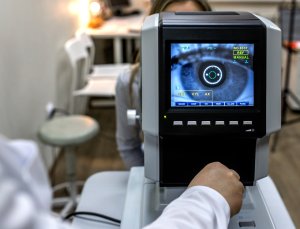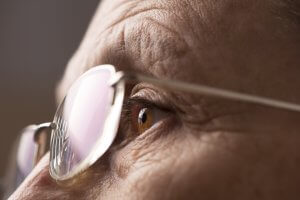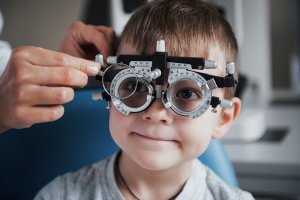“...takes the time to listen to your concerns and explains everything in detail.”
— Actual patient review posted on HealthGrades.com
Count on the corneal eye care experts at Eye Consultants of Pennsylvania
The cornea is the clear “window” that allows light to pass into the eye. When the cornea is damaged, either by injury like a corneal abrasion or scratch, allergies or disease, light rays entering the eye are scattered irregularly, decreasing one’s quality of vision. Fortunately, there are a number of medical and surgical therapies to maintain or restore corneal clarity — and your clarity of vision.
Millions of Americans suffer from injuries, allergies or diseases that can swell, scar or misshape the cornea. Some are genetic like Fuchs’ Dystrophy or Keratoconus. Others result from infections like those associated with Herpes Virus, Shingles or contact lenses. Still others result from physical injury like a corneal abrasion or corneal scratch.
Our corneal eye care specialists and surgeons are Board-Certified and Fellowship-trained. They utilize the most advanced diagnostic and treatment technologies and are very experienced with the latest minimally invasive surgical techniques. They can help you choose the treatment option that’s best for you.
When it comes to corneal injury or disease, insist on the experts
Each of our Corneal specialists is Board-Certified and Fellowship-Trained. That’s quality and experience you can trust. They utilize the latest technology and enjoy an excellent reputation and high patient satisfaction. From the first moment a friendly staff member greets you, throughout your treatment, you’ll receive the compassionate care and personal attention that you deserve.
Cataract, Corneal Eye Care, LASIK
Board-Certified, Fellowship-Trained
Wyomissing, Pottstown
Corneal Eye Care, Cataract Surgery
Board-Certified, Fellowship-Trained
Wyomissing, Pottsville, Lebanon
What is the cornea?
The cornea is the eye’s outermost layer. It is the clear, domeshaped surface that covers the front of the eye. It plays an important role in focusing your vision. Although the cornea may look clear and seem to lack substance, it is a highly organized tissue. Unlike most tissues in the body, the cornea contains no blood vessels to nourish or protect it against infection. Instead, the cornea receives its nourishment from tears and the aqueous humor (a fluid in the front part of the eye that lies behind the cornea). The tissues of the cornea are arranged in three basic layers, with two thinner layers, or membranes, between them. Each of these five layers has an important function, and each is subject to unique risks and diseases.
What are some common conditions that affect the cornea?
The most common conditions involve injuries, allergies and disease.
Injuries: After minor injuries or scratches, the cornea usually heals on its own. Deeper injuries can cause corneal scarring, resulting in a haze on the cornea that impairs vision. If you have a deep injury, or a corneal disease or disorder, you could experience pain in the eye, a sensitivity to light, reduced vision or blurry vision, redness or inflammation in the eye, or headache, nausea or fatigue.
Allergies: The most common allergies that affect the eye are those related to pollen, particularly when the weather is warm and dry. Symptoms in the eye include redness, itching, tearing, burning, stinging, and watery discharge, although usually not severe enough to require medical attention. Antihistamine decongestant eyedrops effectively reduce these symptoms. Rain and cooler weather, which decreases the amount of pollen in the air, can also provide relief.
Disease: There are many diseases of the cornea; however, the most common diseases are keratoconus (a progressive thinning of the cornea that distorts the corneal surface, resulting in blurry vision), contact lens-related infections (contact lens use – especially overnight wear -- increases the risk of corneal infection), Fuch’s Distrophy (a genetic disease in which the cornea becomes progressively swollen), herpetic eye disease (a common viral problem that causes scarring and corneal surface problems) and Anterior Basement Membrane Degeneration (ABMD) which causes irregular ridges on the surface of the cornea that can blur vision and sometimes predispose individuals to recurrent corneal abrasions.
What are my treatment options?
Treatment options depend upon the cause of the problem but can include options from medications to special contact lenses to laser surgery to corneal transplant. Based on your vision diagnosis during examination, our corneal specialists will discuss with you the most appropriate treatment options.
Learn more about corneal injury or disease diagnosis and treatment.
“I have had Dr. Primack as my Eye Cornea Specialist since 2012 and I have the highest regard for his skills, experience and as a person. He has been the perfect professional and person in my experience.”
What do our patients say?
See what our patients say about the doctors at Eye Consultants of Pennsylvania.
Take the first step.
If you experience pain in the eye, a sensitivity to light, reduced vision or blurry vision, or redness or inflammation in the eye, a careful, comprehensive eye examination by one of our specialists is the first step. Our doctors use very specialized technologies — and years of training and experience — to examine your eyes and check for the presence of injury or disease. At your examination, your doctor will personally discuss with you the health of your eyes, how your condition is affecting your vision and what treatment options are available. The bottom line: trust the experts. Insist on Eye Consultants of Pennsylvania.
Does my insurance plan
cover my eye care?
Find out what insurance we accept and what is covered by insurance.
Learn more about
corneal eye care
We’re committed to patient education. Get more information about corneal eye care, including diagnoses and treatment options.
Schedule an Appointment
Schedule an appointment with one of our specialists.





